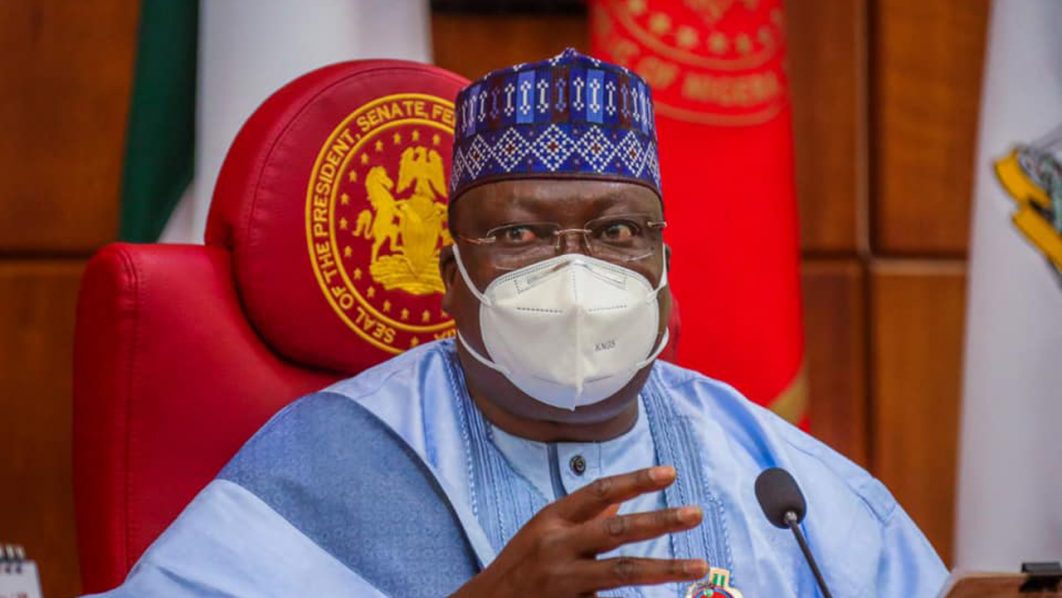
• N’ Assembly to deliberate on constitutional amendment early 2022, says Lawan
Senate, yesterday, passed N17.126 trillion as of the budget for the 2022 fiscal year, raising the figure by N800 billion.
It followed consideration of a report by the Committee on Appropriations. House of Representatives had also passed the budget on Tuesday. President Muhammadu Buhari had submitted a budget of N16.391 trillion to the National Assembly.
The Senate raised the oil benchmark to $62, as against $52 proposed by the executive, while the exchange rate was retained at N410.15. It said the increase in oil price was to reflect the current market values of the oil barrel in the international market.
In his presentation, Chairman of the Committee, Jibrin Barau (APC, Kano North), said out of the N17.126 trillion, N869.6 billion is for statutory transfers; N3.8 trillion for debt service; N6.9 trillion for recurrent expenditure; and N5.4 trillion for capital expenditure.
He said the exchange rate was pegged at N410.15/$1, Gross Domestic Product (GDP) rate at 4.2 and inflation rate at 13 per cent.
A breakdown of recurrent expenditure shows that N61,079,757,342 was budgeted for the Presidency in 2022; N996,09 1,292,618 for Defence; N79,243,483,198 for the Ministry of Foreign Affairs; N55,796,274,038 for Federal Ministry of Information and Culture; N257,626,461,524 for Ministry of Interior; N7,919,353,247 for Office of the Head of Civil Service of the Federation; and N4,476,854,068 for the Auditor General for the Federation.
Federal Ministry of Police Affairs received N518,532,292,470; Ministry of Communications and Digital Economy got N23,387,996,618; National Security Adviser, N155,820,214,009; Infrastructure Concession Regulatory Commission, N1,344,674,257; Secretary to the Government of the Federation, N62,575,420,244; Federal Ministry of Special Duties and Inter-Governmental Affairs, N4,439,614,685; Federal Ministry of Agriculture and Rural Development, N75,544,228,649; and Federal Ministry of Finance, Budget and National Planning, N28,604, 104,969.
Federal Ministry of Industry, Trade and Investment received N17,966,745,438; Federal Ministry of Labour and Employment, N14,453,726,978; Federal Ministry of Science, Technology and Innovation, N49,683,523,165; Federal Ministry of Transport, N15,892,132,819; Federal Ministry of Aviation, N7,692,548,460; Federal Ministry of Power, N6,262,156,943; and Ministry of Petroleum Resources, N30,502,257,191.
Also, N12,038,392,758 was budgeted for Ministry of Mines and Steel Development; N31,935,604,197 for Federal Ministry of Works and Housing; N870,534,226 for National Salaries, Incomes and Wages Commission; N456,245,928 for Fiscal Responsibility Commission; N10,669,058,320 for Federal Ministry of Water Resources; N26,761,780,448 for Federal Ministry of Justice; and N11,655,253,717 for the Independent Corrupt Practices and Related Offences Commission.
Others are Federal Capital Territory Administration, Nil; Federal Ministry of Niger Delta, N2,569,680,304; Federal Ministry of Youth and Sports Development, N185,489,102,966; Federal Ministry of Women Affairs, N2,103,758,084; Federal Ministry of Education, N593,473,925,256; Federal Ministry of Health, N462,858,698,619; Federal Ministry of Environment, N22,796,647,842; National Population Commission, N8,880,618,082; and Ministry of Humanitarian Affairs, Disaster Management and Social Development, N7,669,972,542.
Federal Code of Conduct Bureau received N2,343,845,401; Code of Conduct Tribunal, N830,910,644; Federal Character Commission, N3,272,871,999; Federal Civil Service Commission, N1,217,473,478; Police Service Commission, N926,505,919; and Revenue Mobilisation, Allocation, and Fiscal Commission, N2,337,230,632.
The Senate adjourned the plenary till January 18, 2022.
MEANWHILE, the National Assembly will commence deliberations on constitutional amendment, early next year.
Senate President, Ahmad Lawan, who gave the assurance in his remarks, moments before the chamber proceeded on recess, said: “When we return, we have one major legislation that has not been attended to at all, as a chamber, and that is the constitutional amendment.
“Our Committee on Review of the 1999 Constitution has been doing its work. But as a chamber, we haven’t finished working on it. We are expectant that our Committee will be presenting the report to this chamber as soon as we resume. The Committee has done so much, and the report is almost ready.
“When we harmonise with our colleagues in the House, we should be able to vote on issues that will particularly bring about peace, unity and good government in our country, before such bill will be sent to the State Houses of Assembly for concurrence.”
The Senate President expressed gratitude to God for the progress recorded in actualisation of the legislative agenda of the 9th Senate.
He said timely assent of the 2022 Appropriations Bill into law would ensure commencement of its implementation by January next year. He noted that businesses operating in the country, as well as the economy, will be impacted positively by the timely passage of the budget.
He said: “For the 2022 Appropriation Bill, we are expecting it will be cleaned up between today and tomorrow, and we hope that by tomorrow, the bill will be sent to Mr. President for his assent. We are very optimistic that Mr. President will assent to the bill, as he did for 2020 and 2021 so that by January 2022, the implementation of Budget 2022 will commence.
“We have seen benefits of passing and assenting to the budget in good time, especially when we had to fight COVID-19. The consequence of the implementation of the budget in 2021 and 2020 was very clear. We believe that the economy of Nigeria, and Nigerian businesses, especially, will continue to benefit from passage of the Appropriation Bill in time.”



